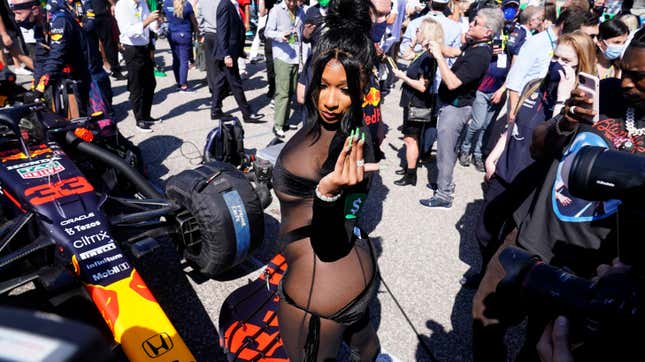
The Powers That Be in Formula One have apparently not recovered from the United States Grand Prix grid walk. There, former driver and commentator Martin Brundle asked rapper Megan Thee Stallion for an interview, only to be rebuffed by her bodyguards. He — and other higher-ups in F1 — remain so incensed that they’ve introduced something that’s currently being called the Brundle Clause.
Basically, any celebrity entering the F1 pre-race grid will have to leave their bodyguards at the door and grant an interview to Brundle should he ask for one.
“There have been new rules introduced, that any celebrities on the grid must not have bodyguards any longer,” Brundle explained during the broadcast for the Mexican Grand Prix. “It must be the ‘Brundle clause,’ and they’re obliged to talk to me. I sort of like it if they ignore me, to be honest.”
All this because a bodyguard pushed him away from Megan Thee Stallion.
“I like to call out some of the celebs that I think are just using the grid a little bit if I’m honest,” Brundle added in an interview. “They don’t really have a passion. I know there are millions of fans at home going ‘I should be on that grid. I’m a massive Formula 1 fan, not them’.
“But my claim to fame at last. I get ignored by Megan Thee Stallion, I get biffed out of the way by a man mountain and then told off by a Malfoy lookalike who doubtless was on his first-ever time to a Formula 1 grid. I put out a simple tweet about it and got five million impressions. I don’t understand any of that, to be honest.”
I’m going to put something out there that may be potentially blasphemous. Martin Brundle is just not that important, and neither is F1.
F1 has long struggled with a bad case of elitism, and that’s part of what has kept the series from really finding a strong foothold in America. Why should we deal with some snobby race car fans looking down their nose at anyone who hasn’t been a fan of the sport since 1972? Why deal with someone who feels that your way of getting interested in the sport (say, because of Drive to Survive) isn’t legitimate? Why put up with a bunch of Europeans who think our only experience with motorsport is watching stock cars drive around in circles?
That attitude admittedly transformed F1 into the multi-billion dollar enterprise it was during the era of hefty television deals, but people have a fundamentally different way of relating to sports now. The Ecclestone-era insistence upon sticking races behind paywalls and totally cutting off fans from the sport didn’t work. Instead, F1 has found a rich new fanbase through things like Drive to Survive, the Netflix docuseries that actually turned a bunch of kinda-boring race car drivers into interesting, well-fleshed-out human beings.
Now isn’t the time to double down on the attitudes of a bygone era, not when F1 has been relying on recruiting an American audience as a significant part of its growth strategy. F1 needs to ask itself what’s more important: pleasing the old guard like Martin Brundle, or moving into a new era where F1 still has to prove itself in front of younger viewers. You’re not going to get the latter if you’re more focused on giving a platform to a man who wants to interrogate the credentials of any person who dares set foot in his sacred motorsport realm.